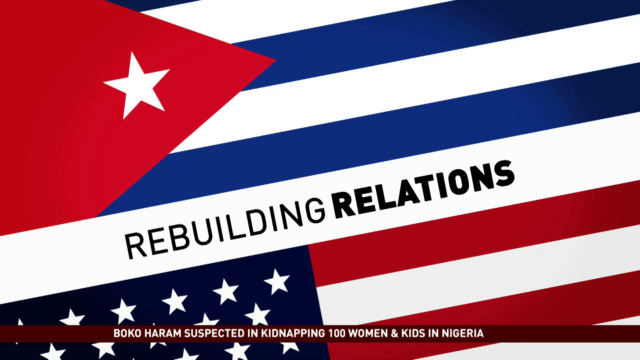As the U.S. and Cuba pursue a thaw in diplomatic relations, reaction in Cuba is heating-up. CCTV America’s Michael Voss reported the reaction to this historic news from Havana.

While many cheered the news, there is still a long way to go before relations can fully return to normal, including lifting the trade embargo against Cuba. It would take an act of Congress to end the embargo, and no one expects that it could happen anytime soon.
Every morning hundreds of Cubans gather outside of the U.S. Interests Section in Havana, hoping to get tourist or immigration visas. There is a huge U.S. diplomatic presence in Havana where 67 Americans and nearly 300 local staff work.
A tourism ban also still stands, but U.S. President Barack Obama is making it easier for Americans to get permission to visit the island and they can now use U.S. credit cards when they travel in Cuba.
Much of Cuba’s fledgling private sector could also benefit from changes which will increase the amount of money Cuban-Americans can send home.
Giovanni Ramirez runs a mobile phone and laptop repair business. Every day, he searches for spare parts on the black market. With the U.S. lifting restrictions on some communication equipment sales to Cuba, Ramirez hopes his business can improve.
“With the re-establishment of relations I think that things will go fine. If we can get more technology and import parts for our business it would make a big difference,” Ramirez said.
Perhaps the biggest news to many Cubans is the prisoner swap and the return of three Cuban intelligence officers who have spent more than 15 years in U.S. jails that are considered national heroes.
Many Cubans watched state television broadcasts showing the tearful reunions with the prisoners’ wives and families as well as neighborhood street parties held in their honor.
Obama opponents criticize decision to renew ties with Cuba
Some of President Obama’s political opponents are vowing to prevent the White House from implementing changes in U.S.-Cuba policy. CCTV America’s Nathan King reported this story from Washington D.C.

His opponents are quick to remind the White House that the U.S. Congress has the ultimate authority to lift the trade embargo against Cuba. There are six separate laws responsible for the sanctions against Cuba and a number of actions the U.S. Congress could take, including:
- Bar funds for establishing an embassy and staff in Cuba
- Refuse to confirm any potential ambassador to Cuba
- Maintain the travel and trade embargo until congressional demands on Cuba are met
Much of the embargo legislation also requires that no Castro is in power in Cuba when an embargo is lifted, and that Cuba takes steps to democratize.
But many Cuba experts recognized the president has broad discretion to implement the policy, and by embracing Cuba in this way, they said he is reducing the influence of Cuban Americans that had held the balance of political power in Florida and beyond.
“They basically held Florida hostage in saying that if you don’t go with the embargo and with our point of view on Cuba, Florida will vote against you is now solved,” Erick Langer, a Georgetown University professor, said.
Attorney David Leopold discusses US-Cuba relations
CCTV America interviewed David Leopold, the former president of the American Immigration Lawyers Association about how renewed relations between Cuba and the U.S. could influence immigration policy.

Tomas Bilbao of Cuba Study Group discusses how US-Cuba ties are changing
CCTV America also spoke to Tomas Bilbao, the executive director of the Cuba Study Group about the changing relationship between the U.S. and Cuba.

Philip Brenner of American University discusses next steps in US-Cuba ties
CCTV America interviewed Philip Brenner, professor of international relations at American University about the decision to rebuild relations with Cuba.

 CGTN America
CGTN America
